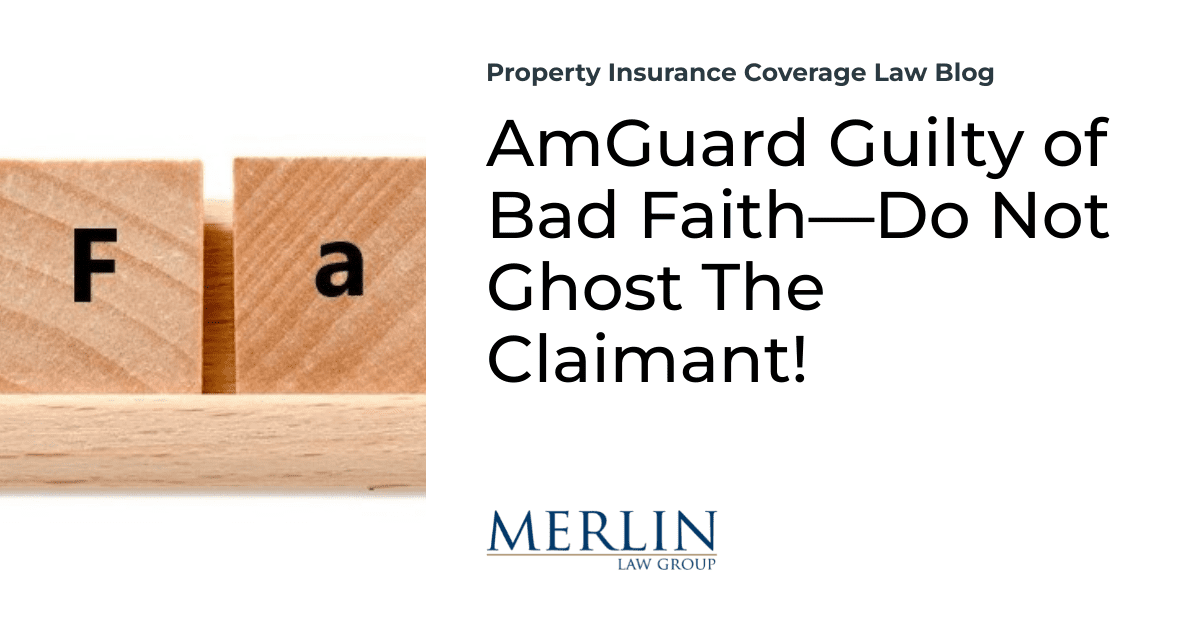AmGuard Guilty of Bad Faith—Do Not Ghost The Claimant!

AmGuard has been having trouble with delayed claims where it is not promptly responding to inquiries from its customers or making claims payments. A recent jury verdict in Missouri found AmGuard guilty of vexatious refusal to pay a fire, vandalism, and resulting freeze claim. I previously noted similar AmGuard conduct from a Washington case in Claim Delay Leads to Bad Faith Judgement.
Two letters attached to the complaint demonstrate the “ghosting”1 The first letter of November 9, 2020, stated:
This letter follows my attempts to contact you through e-mail and voicemail respecting the status of the above matter. I understand that Jennifer A. Turner of Summit Insurance Group has similarly attempted to contact you about the above-referenced claim. To date, however, neither you nor anyone else at Berkshire Hathaway Guard Insurance Companies (“BHG”) has responded to our queries.
As I said in my e-mail of September 22, 2020, I have been retained to represent Academy Bank, N.A., in the above claim. Academy Bank is the mortgage holder and loss payee under the policy issued to Shri Ganesai, LLC (see attached ‘Businessowners Policy Changes’ endorsement).
You are already well aware that Shri Ganesai, LLC, has made a claim under the policy respecting a fire loss that occurred on the insured’s property on or about October 2, 2019. My understanding is that BHG is still processing and investigating this claim and that it has not yet made any coverage determination relative to Shri Ganesai, LLC.
… It has now been over a year since the subject fire loss and Academy Bank needs to have some information about what is holding up BHG’s coverage decision.
On March 4, 2021, the following was written to AmGuard:
Reference is made to that letter dated November 9, 2020, from prior counsel to Academy, Norris Keplinger Hicks & Welder, seeking information on the policy and claim. The information requests on behalf of Academy have been ongoing since at least September 2020. The requests and demands made therein are restated and incorporated by reference here. We are aware of no response from the insurer. Academy continues to demand delivery of all policy documents and any basis to withhold payment under the policy to Academy.
…
Accordingly, Academy demands payment in immediately available funds to Academy no later than March 15, 2021. If payment or delivery of the document or basis on which payment is not owed is not received by that date, Academy will commence legal action….
I hope those attorneys did not hold their breath expecting a response. We have seen this type of non-response from AmGuard in other cases.
After the lawsuit was filed in April 2021, AmGuard finally made partial payments.
The jury verdict last week found for the policyholder and the loss payee. The jury awarded contract, vexatious refusal, and attorney’s fees damages against AmGuard.
Insurance companies owe a good faith duty to be prompt when adjusting losses and responding to claimants. These types of jury verdicts hold insurance accountable when they fail that duty.
Thought For The Day
When you develop a reputation for being responsive and generous, an ever-expanding mountain of requests will come your way.
—Adam Grant
____________________________________________________
1 https://en.wikipedia.org/wiki/Ghosting_(behavior) Ghosting, also known as simmering or icing, is a colloquial term which describes the practice of ending all communication and contact with another person without any apparent warning or justification and subsequently ignoring any attempts to reach out or communication made by said person. The term originated in the early 2000s, typically referring to dating and romantic relationships. In the following decade, media reported a rise in ghosting, which has been attributed to the increasing use of social media and online dating apps. The term has also expanded to refer to similar practices among friends, family members, employers and businesses.



